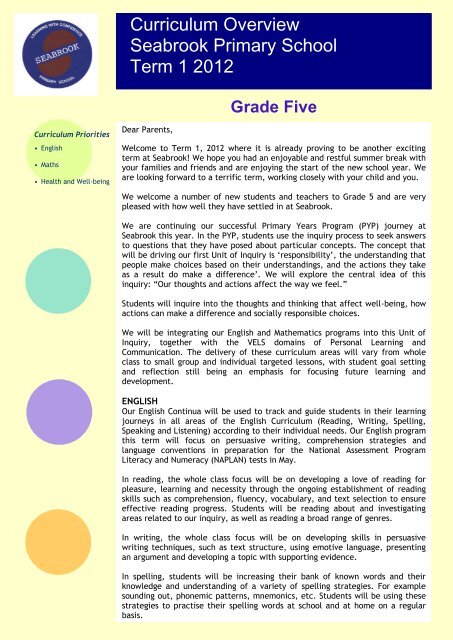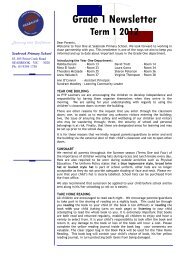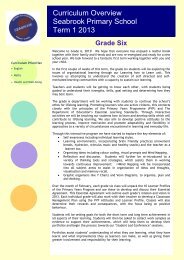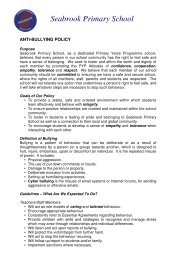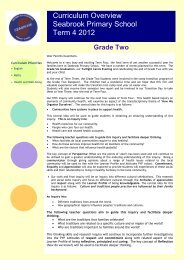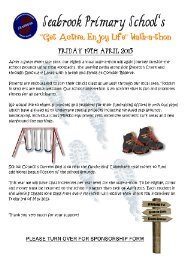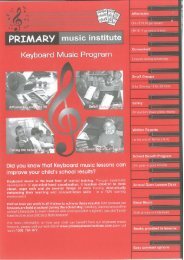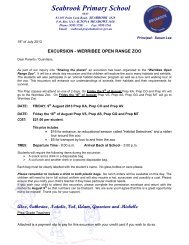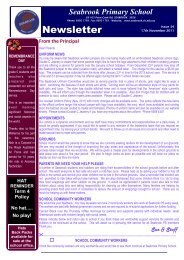Curriculum Overview Seabrook Primary School Term 1 2012
Curriculum Overview Seabrook Primary School Term 1 2012
Curriculum Overview Seabrook Primary School Term 1 2012
You also want an ePaper? Increase the reach of your titles
YUMPU automatically turns print PDFs into web optimized ePapers that Google loves.
<strong>Curriculum</strong> <strong>Overview</strong><strong>Seabrook</strong> <strong>Primary</strong> <strong>School</strong><strong>Term</strong> 1 <strong>2012</strong>Grade Five<strong>Curriculum</strong> Priorities• English• Maths• Health and Well-beingDear Parents,Welcome to <strong>Term</strong> 1, <strong>2012</strong> where it is already proving to be another excitingterm at <strong>Seabrook</strong>! We hope you had an enjoyable and restful summer break withyour families and friends and are enjoying the start of the new school year. Weare looking forward to a terrific term, working closely with your child and you.We welcome a number of new students and teachers to Grade 5 and are verypleased with how well they have settled in at <strong>Seabrook</strong>.We are continuing our successful <strong>Primary</strong> Years Program (PYP) journey at<strong>Seabrook</strong> this year. In the PYP, students use the inquiry process to seek answersto questions that they have posed about particular concepts. The concept thatwill be driving our first Unit of Inquiry is ‘responsibility’, the understanding thatpeople make choices based on their understandings, and the actions they takeas a result do make a difference’. We will explore the central idea of thisinquiry: “Our thoughts and actions affect the way we feel.”Students will inquire into the thoughts and thinking that affect well-being, howactions can make a difference and socially responsible choices.We will be integrating our English and Mathematics programs into this Unit ofInquiry, together with the VELS domains of Personal Learning andCommunication. The delivery of these curriculum areas will vary from wholeclass to small group and individual targeted lessons, with student goal settingand reflection still being an emphasis for focusing future learning anddevelopment.ENGLISHOur English Continua will be used to track and guide students in their learningjourneys in all areas of the English <strong>Curriculum</strong> (Reading, Writing, Spelling,Speaking and Listening) according to their individual needs. Our English programthis term will focus on persuasive writing, comprehension strategies andlanguage conventions in preparation for the National Assessment ProgramLiteracy and Numeracy (NAPLAN) tests in May.In reading, the whole class focus will be on developing a love of reading forpleasure, learning and necessity through the ongoing establishment of readingskills such as comprehension, fluency, vocabulary, and text selection to ensureeffective reading progress. Students will be reading about and investigatingareas related to our inquiry, as well as reading a broad range of genres.In writing, the whole class focus will be on developing skills in persuasivewriting techniques, such as text structure, using emotive language, presentingan argument and developing a topic with supporting evidence.<strong>Overview</strong> <strong>Term</strong> 1 2011 – Grade 5 Page 2 of 5In spelling, students will be increasing their bank of known words and theirknowledge and understanding of a variety of spelling strategies. For examplesounding out, phonemic patterns, mnemonics, etc. Students will be using thesestrategies to practise their spelling words at school and at home on a regularbasis.
<strong>Curriculum</strong> <strong>Overview</strong> <strong>Term</strong> 1 <strong>2012</strong> – Grade 5Page 2 of 5In oral language students will be supported to extend their ability tocommunicate and interact with others, including peers and staff, throughartefact contributions and whole class and small group discussions. Literacyskills will be developed through a variety of learning experiences such as: explicit skills teaching via mini-lessons targeted literacy groups daily individual reading, writing, spelling, speaking & listening goal setting and reflection sustained independent reading both at schooland at homeMATHEMATICSOur Mathematics program will cover concepts from the areas of Number,Measurement, Space, Chance and Data and Structure. The focus initially willbe on preparing for NAPLAN. It is very important that our children have adeep and thorough knowledge of the basic number facts using the fouroperations (addition, subtraction, multiplication and division) up to at least1000, including the multiplication (times) tables. Knowing how to tell thetime using both analogue and digital clock faces, understanding calendarsand 24 hour time, decimals, fractions and percentages and 2D and 3D shapesare also mathematical understandings that we will be exploring in the comingweeks. We also encourage our children to use concrete materials likecounters, MAB and unifix cubes, clocks and actual shapes to assist them indeveloping a solid understanding of mathematical concepts. These skills willbe developed through a variety of learning experiences such as: Explicit skills teaching Hands-on activities Automatic response tasks, aimed at improving fluency Open-ended problem solving activities MathleticsTogether with our academic programs and our commitment tointernationalism, we encourage our students to demonstrate the PYPAttitudes and the Learner Profile attributes on a daily basis. We, along withall staff, also model these daily. Students have been working on theirunderstandings of the Attitudes and Learner Profile in order to establish abetter understanding of school routines and learning experiences. For thepast few weeks, students have been involved in ‘Learning How to Learn’,encompassing how best they learn, enabling classes to establish theirEssential Agreements in areas such as effective learning and study practices,classroom behaviour, friendships and classroom routines.Students will set goals using the Western Australia First Steps continua, VELSand other resources. They will also identify strategies that they will be usingto achieve their stated goals.Brain friendly practices continue to be a daily focus at <strong>Seabrook</strong>. Students areencouraged to re-hydrate by drinking water throughout the day as well aseating healthy foods such as fresh and dried fruit and vegetables. Pleaseencourage your child to bring a water bottle to school every day.<strong>Curriculum</strong> <strong>Overview</strong> <strong>Term</strong> 1 2011 – Grade 5 Page 3 of 5Of course, it is essential that all children eat a nutritious breakfast tofacilitate learning and provide energy to make the most of our rigorouscurriculum. Walking, physical activity including jogging, stretching and quickbreaks during working sessions will be offered, to sustain higher orderthinking and working efforts.
<strong>Curriculum</strong> <strong>Overview</strong> <strong>Term</strong> 1 <strong>2012</strong> – Grade 5Page 3 of 5Mind mapping continues to be a platform for learning. The use of graphicorganisers such as De Bono’s DATT (Direct Attention Thinking Tools) andThinking Hats, Y-charts and Venn diagrams are used to support learning. Thechildren reflect on their work regularly with the portfolio showcasing some ofthe student’s chosen learning.Home learning for students in Grade 5 should take approximately 45 minutesper night. This term, it will consist of a variety of tasks. Students are expectedto read for at least 20 – 30 minutes outside of school every day, includingweekends. They will also be expected to complete a range of Literacy,Numeracy and Inquiry learning experiences. Each class will complete anessential agreement that will set the expectations for home learning for theyear.Another exciting addition to the year is the student diaries. These will offerstudents the opportunity to become more independent and responsible forcommunication between parents and teachers as well as their own learning.The grade five team would greatly appreciate the support of all parents bychecking and signing their child’s diary on a weekly basis.Grade 5 students are currently participating in the specialist classes of PhysicalEducation (P.E.) with Blair Ganley, Art with Julie Comer, LOTE (Italian) RosSavoia. This year library sessions will be guided by each classroom teacher.National Assessment Program – Literacy and Numeracy (NAPLAN)The 2011 NAPLAN dates are as follows: Tuesday 15 MayLanguage Conventions - spelling, grammar and punctuation (40 minutes); andWriting – persuasive text (40 minutes) Wednesday 16 MayReading (50 minutes). Thursday 17 MayNumeracy - number, algebra, space, pattern and measurement, chance anddata (50 minutes)E-LEARNINGStudents will be shown how to log onto the Ultranet and learn how to use thedifferent learning spaces available. Students will have the opportunity to designtheir own spaces where they can showcase their learning. We aim to teach theskills where they will be confident enough to train their parents or guardians onhow to log onto the Ultranet.Students will be exposed to a range of ICT skills that support their unit ofinquiry. They will be encouraged to use different media software where theycan express their ideas thoughts or concerns. With the Mac books programcontinuing this year teachers and students will extend the learning journey byusing both platforms. Students will be given opportunities and choices in arange of applications to support their learning tasks.We look forward to an exciting term! Please contact us at any time if you haveany questions. Thank you for your support.Aaron Chaston, Alicia Oliver-Cook, Rebecca Moore, Ronika Raju &Dolores GiordimainaGrade 5 Team
<strong>Curriculum</strong> <strong>Overview</strong> <strong>Term</strong> 1 <strong>2012</strong> – Grade 5Page 4 of 5ITALIAN – Ros SavoiaThis term in Italian, the children will focus on the ‘PYP attitudes in Italian”and “Feelings”. Students will be introduced to the vocabulary, names andsentence structures relating to the PYP and Feelings. Various oral andwritten language games and activities, dramatisation, performing actions andwriting in the language will allow the students to develop strategies formemorisation and comprehension of this new vocabulary and sentencestructures. Previously learnt language and current vocabulary will be usedto determine new meanings, definite articles, gender and description.The students learn to recognise familiar words and identify some commonelements in the language that differ from, or are similar to English.HEALTH & PHYSICAL EDUCATIONBlair Ganley & Kelleigh EvansDuring term one, the grade five children will be introduced to a variety ofFundamental Motor Skills activities. The focus will be on throwing, catchingand bouncing. These skills will be practised using various games and sports.Through modified major games (for example, games with modified rules,equipment, playing field, length of game or numbers on a team such asmodified netball), students will begin to apply their skills in sport-specificsettings. They will explore game tactics such as: introducing the concepts ofattack and defence and describing the roles of various positions. Children willparticipate individually and in partner and group based activities. A majorfocus will be on integrating a fitness component into all sessions.Children will have the opportunity to participate in school swimming trialsand a district swimming carnival.As part of the Physical Education program, the P.Y.P Attitudes such ascooperation, commitment and enthusiasm and the Student Profiles such asrisk taking, caring and reflection will be linked to the way children work andparticipate in Physical Education sessions.
<strong>Curriculum</strong> <strong>Overview</strong> <strong>Term</strong> 1 <strong>2012</strong> – Grade 5Page 5 of 5ARTJulie ComerAO /RMThe Children will make art works in the art form of drawing. The children willexperiment with imaginative and innovative ways of generating ideas andmanipulating art elements (line, shape, texture, form, space and tone) andprinciples (e.g. proportion, pattern, symmetry, repetition, scale andproportion) to explore the potential of ideas. They will be given opportunityto gain inspiration from a broad range of sources including arts works fromdifferent cultures and styles.The PYP Learner Profile will be used to guide the children to understand howgood learners learn and therefore take responsibility for their learning in theart room. The Learner Profile encourages all children to be inquirers,knowledgeable, thinkers, communicators, principled, open-minded, caring,risk-takers, balanced and reflective.This term there will be a particular emphasis on being: Caring. They will show empathy and, compassion and respect towards theneeds and feelings of other children in the art room as well as showingcommitment to their work in the art room. Thinkers. The children will be encouraged to give thought to their workbefore they take action and weigh up the possible outcomes of thedifferent opportunities that can be explored when developing their artwork. When creating an artwork the children will sometimes be presentedwith the challenges and they will be encouraged to be problem solvers.The children will begin the year supporting their classroom work of “LearningHow To Learn”. We will discuss the concept of intelligence and from thiscreate an artwork. The children will also create artworks inspired by theocean. They will investigate and discuss specific sea creatures. They willidentify the elements and principles they can see in nature and use thisknowledge to develop creative artworks. They will also look at chosen artistsand their interpretation and the mediums they use.Paul CochranAC / RRAt Level 4, students independently and collaboratively experiment with andapply a range of skills, techniques and processes using a range of media,materials, equipment and tools to plan, develop, refine, make and presentarts works. In their arts works, they communicate ideas and understandingsabout themselves and others, incorporating influences from their own andother cultures and times. They evaluate the effectiveness of their arts worksand make changes to realize intended aims. They consider purpose andsuitability when they plan and prepare arts works for presentation to a varietyof audiences.During term one the focus in art will be the exploration of the artelements/princples of line, shape and colour. The students will explore theseactivities through a range of activities involving the visual art areas ofdrawing, painting and modelling based around the PYP Unit of Inquiry- CentralIdea: “Our Thoughts and feelings affect the way we feel”. The children will beencouraged to further develop the PYP profiles and attitudes of being acommunicator, expressing their ideas confidently and creatively whilst beinga risk taker with their learning by approaching new experiences withconfidence.


